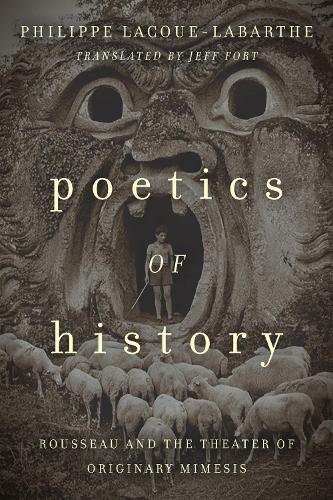Poetics of History
Poetics of History
Regular price
Checking stock...
Regular price
Checking stock...
Summary
Poetics of History places Rousseau at the origin of modern speculative philosophy by showing that his thinking on the theater, despite its dependence on a false and conventional reading of Aristotle, nonetheless articulates a radical thinking of originary mimesis, and, well before Hegel, an understanding of catharsis as Aufhebung.
The feel-good place to buy books
- Free US shipping over $15
- Buying preloved emits 41% less CO2 than new
- Millions of affordable books
- Give your books a new home - sell them back to us!

Poetics of History by Philippe Lacoue-Labarthe
Rousseau’s opposition to the theater is well known: Far from purging the passions, it serves only to exacerbate them, and to render them hypocritical. But is it possible that Rousseau’s texts reveal a different conception of theatrical imitation, a more originary form of mimesis? Over and against Heidegger’s dismissal of Rousseau in the 1930s, and in the wake of classic readings by Jacques Derrida and Jean Starobinski, Lacoue-Labarthe asserts the deeply philosophical importance of Rousseau as a thinker who, without formalizing it as such, established a dialectical logic that would determine the future of philosophy: an originary theatricality arising from a dialectic between “nature” and its supplements. Beginning with a reading of Rousseau’s Discourse on Inequality, Lacoue-Labarthe brings out this dialectic in properly philosophical terms, revealing nothing less than a transcendental thinking of origins. For Rousseau, the origin has the form of a “scene”—that is, of theater. On this basis, Rousseau’s texts on the theater, especially the Letter to d’Alembert, emerge as an incisive interrogation of Aristotle’s Poetics. This can be read not in the false and conventional interpretation of this text that Rousseau had inherited, but rather in relation to its fundamental concepts, mimesis and katharsis, and in Rousseau’s interpretation of Greek theater itself. If for Rousseau mimesis is originary, a transcendental structure, katharsis is in turn the basis of a dialectical movement, an Aufhebung that will translate the word itself (for, as Lacoue-Labarthe reminds us, Aufheben translates katharein). By reversing the facilities of the Platonic critique, Rousseau inaugurates what we could call the philosophical theater of the future.
Philippe Lacoue-Labarthe (Author)
Philippe Lacoue-Labarthe was Professor of Philosophy at the Universite Marc Bloch, Strasbourg. His many books include Poetry as Experience; Typography: Mimesis, Philosophy, Politics; and, with Jean-Luc Nancy, The Literary Absolute: The Theory of Literature in German Romanticism.
Jeff Fort (Translator)
Jeff Fort is Associate Professor of French at the University of California, Davis, and the translator of more than a dozen books, by Jean Genet, Jacques Derrida, Maurice Blanchot, Jean-Luc Nancy, and others.
Philippe Lacoue-Labarthe was Professor of Philosophy at the Universite Marc Bloch, Strasbourg. His many books include Poetry as Experience; Typography: Mimesis, Philosophy, Politics; and, with Jean-Luc Nancy, The Literary Absolute: The Theory of Literature in German Romanticism.
Jeff Fort (Translator)
Jeff Fort is Associate Professor of French at the University of California, Davis, and the translator of more than a dozen books, by Jean Genet, Jacques Derrida, Maurice Blanchot, Jean-Luc Nancy, and others.
| SKU | Unavailable |
| ISBN 13 | 9780823282340 |
| ISBN 10 | 0823282341 |
| Title | Poetics of History |
| Author | Philippe Lacoue-Labarthe |
| Condition | Unavailable |
| Binding Type | Hardback |
| Publisher | Fordham University Press |
| Year published | 2019-02-05 |
| Number of pages | 176 |
| Cover note | Book picture is for illustrative purposes only, actual binding, cover or edition may vary. |
| Note | Unavailable |
